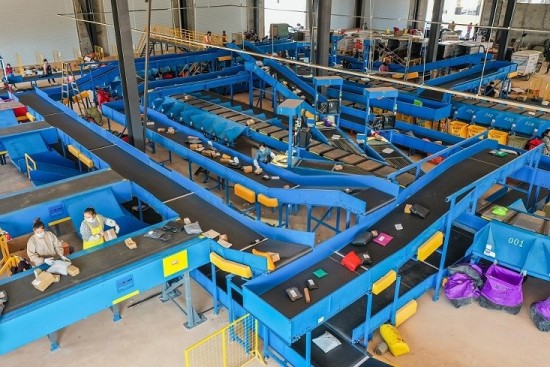Driven by
the development of a new generation of information technology, intelligent
logistics is speeding up in China, giving a leg up to the country's
development.
According to statistics, the overall market size of China's
intelligent logistics stood at 35.67 billion yuan ($5.11 billion) in 2020, and
the figure surged to 128.05 billion yuan as of October this year, with an
average annual compound growth of over 70 percent.
With digitalization, modern warehouses are no longer merely
"transfer stations," but key nodes that offer targeted services.
Intelligent warehousing systems now play a crucial role in the logistics
sector.

Express
delivery parcels are sorted by a smart system in a logistics park in Lanshan
county, Yongzhou, central China's Hunan province, October 2022. (People's Daily
Online/Peng Hua)
In smart warehouses, cargos are sorted and moved by logistics
robots, and real-time information about cargo vehicles is shown on big screens.
What's more, the "last kilometer" problem is now solved by unmanned
delivery vehicles that are able to carry all types of parcels.
In the warehouse of an industrial park owned by Chinese e-commerce
giant JD Group in Yiwu, east China's Zhejiang province, over 100 automated guided
vehicles are employed. Guided by QR codes and an inertial navigation system,
these vehicles are able to precisely deliver cargos to staff members of the
warehouse.
"Warehousing is becoming smarter and smarter, turning from
person-to-goods to goods-to-person," said Weng Bo, who's in charge of the
warehouse.
Weng told People's Daily that the warehouse is able to handle
1,500 orders per hour, which is three times more efficient than traditional
models, and the whole industrial park can process as many as 70,000 orders on a
daily basis.

Automated
devices, including 4-way shuttle movers and automated guided vehicles, work in
a warehouse of an international logistics center in Haikou Integrated Free
Trade Zone, south China's Hainan province, November 2022. (People's Daily
Online/Zhang Junqi)
Automated and intelligent devices are gradually being employed at the delivery end, with contactless delivery becoming "standard configuration."
In October this year, six smart delivery vehicles of JD Logistics, a supply chain solutions and logistics services provider of JD Group, were put into trial operation in a testing base for autopilot vehicles in Shunyi district, Beijing.
These vehicles, which can recognize traffic lights, detect pedestrians and keep staying in the right lane, have a maximum capacity of 200 kilograms and a range of 100 kilometers. They are able to complete over 200 deliveries per day.

A
woman fetches express delivery parcels from an intelligent delivery vehicle in
a national e-commerce demonstration base in Suyu district, Suqian, east China's
Jiangsu province, January 2022. (People's Daily Online/Sun Dongcheng)
He Tian, vice president of JD Group and head of JD Logistics AI and Data Science, told People's Daily that intelligent logistics would enter a new era by 2025, in which artificial intelligence would contribute to the efficient automated development of all logistics links.
"In the future, we'll keep developing the logistics sector with technologies and constantly improving delivery efficiency and service quality to ensure the safety of all logistics links," He noted.
Source: Xinhua








